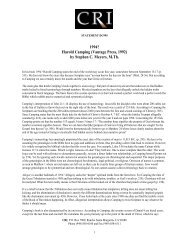What God Joined Together - Family Radio
What God Joined Together - Family Radio
What God Joined Together - Family Radio
Create successful ePaper yourself
Turn your PDF publications into a flip-book with our unique Google optimized e-Paper software.
The key words of Deuteronomy 24:1 are “some uncleanness.” For “some<br />
uncleanness” found in a wife the husband had Biblical cause for divorce. <strong>What</strong><br />
was this sin<br />
The Hebrew word “debar,” which is translated as “some” in the phrase<br />
“some uncleanness,” normally means “word” or “matter.” Out of about 2400<br />
usages in the Bible, “debar” is translated in at least 1000 verses as “speak” or<br />
“talk” or something similar. In other verses it is translated “word” (at least 770<br />
times). Thus, “word” or “talk” are the dominant meanings of the word “debar.”<br />
Less often, but with considerable frequency, “debar” is translated as “act”<br />
(52 times), “matter” (63 times), and “thing” (215 times). Thus, we can safely<br />
say that in Deuteronomy 24:1, “debar” should be translated as “act,” “matter,”<br />
“thing,” or “word.”<br />
The Hebrew word translated as “uncleanness” in this same phrase is<br />
“ervah,” which is found 54 times in the King James Bible. In more than 50 of<br />
these places it is translated “nakedness.” When we examine the places where<br />
it is translated “nakedness,” we find that it usually relates to gross sexual<br />
impurity. For example, in Leviticus 18 and Leviticus 20, where <strong>God</strong> sets forth<br />
commands prohibiting incest, <strong>God</strong> employs the word “nakedness” (“ervah”) at<br />
least 30 times.<br />
Thus, the word “ervah” takes on the meaning “fornication.” In Leviticus<br />
18:8 <strong>God</strong> warns, “The nakedness [ervah] of thy father’s wife shalt thou not<br />
uncover.” A commentary on this warning is found in I Corinthians 5:1:<br />
It is reported commonly that there is fornication among you, and such<br />
fornication as is not so much as named among the Gentiles, that one should<br />
have his father’s wife.<br />
In this verse, <strong>God</strong> uses the word “fornication” in connection with sexual<br />
impurity between a man and his father’s wife. In Leviticus 18:8, <strong>God</strong> speaks<br />
of this kind of sexual impurity as uncovering the nakedness. Therefore, we can<br />
see that “nakedness” or “uncleanness” is synonymous with “fornication.”<br />
Bringing these facts together, we know that in Deuteronomy 24:1 <strong>God</strong> is<br />
teaching that if a man found a “word” or a “matter” of fornication in his wife,<br />
he could write a bill of divorcement and divorce her. Certain acts of<br />
fornication were punishable by death, but if the particular act or word of<br />
fornication did not require the death of the fornicating wife, the husband had<br />
the right to divorce her.<br />
Another understanding of the meaning of “ervah” was what opened the<br />
door for the Israelite husband to divorce his wife under almost any<br />
circumstance.<br />
DIVORCE FOR ANY CAUSE<br />
In Deuteronomy 23:12-14 <strong>God</strong> uses the identical phrase, “ervah dabar,”<br />
which is the key phrase of Deuteronomy 24:1. “Ervah debar” does not refer to<br />
fornication; rather, it refers to ceremonial uncleanness. Deuteronomy 23:12-<br />
14:<br />
12 <strong>What</strong> <strong>God</strong> hath joined together...




